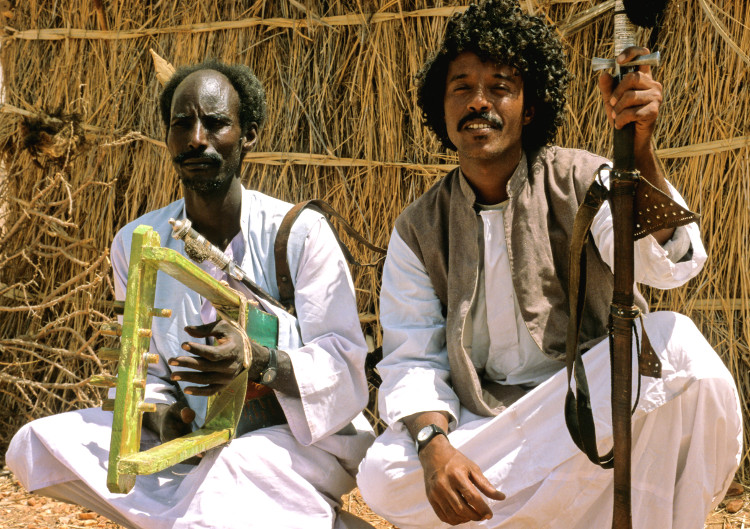BASBAR
Songs of resistance and other songs of the Beja
The Beja people live in the north of Sudan, in the barren, mountainous regions between the valley of the Nile and the Red Sea. Their territory stretches from the borders of Egypt to the north of Eritrea. Their population is estimated to be three million, distributed over a dozen tribes. The Beja are above all nomadic farmers, even though some are now settled and cultivate cereals on the alluvial plains of the rare rivers which cross these arid and desolate regions. The El Gash delta, of the same name as the river which crosses it, is one of these oases of fertility. The Beja are Muslims, partially arabized, and they speak a cushitic language.
In 1956, the independent Sudanese State was created. In 1958, in order to speak with a single voice, the Beja formed a political party which united the various tribes. At the time, the country was going through a period of severe political troubles and was facing a first secessionist rebellion by the southern peoples. Throughout the eighties a new war for the autonomy of the Christian and animist south pitted the Sudanese People's Liberation Army (SPLA), led by colonel John Garang, against the Islamic government in Khartoum. A military coup brought the National Islamic Front (NIF) to power in 1989. In the general clamp down which followed, the Beja Congress, infuriated by the exactions imposed on the Beja community, subject to intense pressure towards assimilation and settlement, decided to take up arms against the central power (Kassala Conference, April 10th 1994) and to rally to the other rebel movements (Declaration of Asmara, 1995).
The first great armed offensive led by the Beja (1997), with the support of the diaspora and the discreet backing of the Eritrean government, liberated a territory several dozen kilometers wide along practically the whole length of the Eritrean border. This territory, where approximately 200 000 Beja live, is today directly administered by the Beja Congress. The civil populations of this liberated zone, victims of a forgotten war, receive only a pitifully insufficient and sadly sporadic international humanitarian aid. The recent intensification of American aid (2000) to the Beja, is probably due only to the recent political and strategic upheavals in the region and... to the huge petroleum interests.
The war led by the Beja against the Islamic regime of Khartoum is not a war of independence but is rather intended to create a federal state in which the Beja would enjoy greater autonomy and the legitimate respect of their cultural identity.

Musical practise
The Beja sing mainly at tribal feasts or during family celebrations (marriages, births, funerals, etc.). Their repertoire is divided into collective songs (with dances) such as the bibobe (in a circle, standing up) and the siera (in a circle, sitting), and individual songs which include both traditional and recent songs. These songs, traditional or modern, can be classified into love songs ( khane ), war songs ( birirt ), epic songs ( akikt ), "critical" songs ( newab ), songs of praise ( hamad ) and funeral songs ( habool ). These last are mainly sung by women. Two types of instruments accompany these songs: a quadrangular symmetrical lyre with five metallic strings ( basenkob ) and drums ( delooka ) with one or two skins. Special drums are sometimes used for special occasions, such as a declaration of war ( nogara ) or for funerals ( kaboor ). Similarly, there is a variation to the women's vocalizations ( leelt ) during funerals ( yeet ).
The public practise of music is generally reserved for men. Women prefer to sing within their family circle and have developed their own repertoire in addition to the traditional repertoire. The learning of music is subject to no particular social rule. It is the talent of a musician which determines his fame. Each community or group also has a professional poet - the labib - who is chosen for his talent. This person may also be a musician, as is the case for Arka Mohammad Sabir, one of the two performers on this record. Labibs enjoy great power and considerable influence. Indeed, it is said to be unwise to get on a labib's wrong side, for his words could pursue your family over several generations...
Arka Mohammad Sabir and Sidi Doshka
Arka Mohammad Sabir - in his thirties - is the first singer of the Beja resistance, a movement which he joined in 1996 after deserting from the regular Sudanese army. He belongs to a reputed line of labib (poets) from the tribe of Gamilab-Redey, established in the region of the river Gash. Nowadays, the songs which made his reputation are known all over the north of Sudan, well beyond the liberated zone. This success is due, among other things, to the community of the Janikat (women of easy virtue) who transmit his repertoire and who have also composed several songs of praise ( hamad ) in his honour. In ancient Beja culture, that's to say before Islamization, morals were much freer. Today, small pockets of this ancestral liberalism persist, allbeit discreetly, as these Janikat prostitutes demonstrate.
Sidi Doshka - also in his thirties - is another famous figure of the Beja resistance. His tribe, the Atman-Sidab, is settled in the region of Port Sudan, a town in which he was a semi-professional musician before joining the Beja Congress in 1999 and participating in the armed struggle.
These recordings were made in June 2001 in Molober, on the border between Eritrea and Sudan. The male chorus singers are militiamen from the Beja People's Liberation army.
The two female singers are from villages in the region.
|
CD Tracks
|

